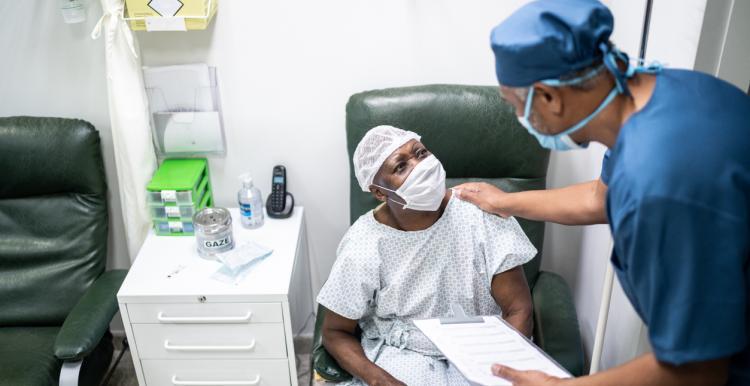NHS proposal to improve orthopaedic surgery in North West London

The North West London Acute Provider Collaborative, made up of the sector’s four acute NHS trusts, developed the proposal to improve quality and reduce long waiting times, primarily for hip and knee replacements. Patients referred to any hospital in north west London for routine inpatient orthopaedic surgery who are generally in good health will have their surgery in the new ‘elective orthopaedic centre’ once opened. Over 4,000 patients a year are expected to have their surgery at the new centre.
End-to-end care for patients who have their operation at the new centre will continue to be the responsibility of the surgical team at their ‘home orthopaedic hospital’, with outpatient care provided locally or online. Patients will only need to travel to Central Middlesex for their operation. Their ‘home orthopaedic hospital’ surgeons will carry out the operation at the elective orthopaedic centre with the support of a permanent, specialist team. Door-to-door transport to and from the new centre will be provided for patients who are unable to travel independently or via an existing patient transport scheme and who would otherwise encounter a long, complex or costly journey.
Care pathways for patients with complex health needs and day-case patients are unchanged and surgery will be provided, as now, at a range of north west London hospitals. These patients will also benefit from shorter waiting times, as moving low-complexity, inpatient surgery to the new centre will free up capacity at these other hospitals.
Dr Roger Chinn, chair of the group that developed the proposal and chief medical officer for Chelsea and Westminster Hospital NHS Foundation Trust, said: “Our new approach to orthopaedic surgery is excellent news for communities across north west London. Centres that focus on specific, routine operations have been shown to produce fewer surgical complications and shorter lengths of stay. They are more efficient too which means we can treat more people and reduce waiting times. Having a centre on a site without an A&E department, like the one planned for Central Middlesex, also means there is much less chance of disruption due to surges in urgent and emergency demand.
“The proposal agreed today benefitted enormously from feedback gathered through our public consultation, and we’re very grateful to everyone who took part. The feedback emphasised the need for additional transport support, for care – between hospitals and with community services – to be fully joined-up and to avoid leaving anyone behind with new ways of working, particularly in terms of expanding digital options. We have built on our initial proposal, committing to a door-to-door transport offer, patient navigators and ensuring in-person alternatives to all digital services.
“We also think the new approach will be good for staff, creating a wider range of roles and more opportunities to learn and develop. We will be creating more detailed workforce plans in partnership with our staff over the coming months but we don’t anticipate that anyone will be expected to move to the new centre unless they choose to do so. We need to appoint more permanent staff for orthopaedic surgery across north west London and so we will be working up a joint recruitment campaign.”
Central Middlesex Hospital is now set to benefit from a £9m investment to create a dedicated 41-bed unit through a small expansion and some re-modelling. The aim is to open the centre later this year, with the project expected to pass additional gateways over the coming months, including approval of a full business case and implementation plan.
The Consultation on the proposal to improve orthopaedic surgery in NW London
Almost 2,000 patients and local people took part in a 14-week public consultation on the proposal to develop a centre of excellence for inpatient orthopaedic surgery at Central Middlesex Hospital, Park Royal.
The four NHS trusts in NW London, in partnership with the integrated care board, invited patients and the public to share their views on this proposal during the consultation period, which closed on 20 January 2023.
A total of 1,959 people participated in the consultation. Overall, participants thought that the proposal for an elective orthopaedic centre for most routine surgery was a good idea and hoped that it would help to reduce waiting times for patients, while there were some people who would prefer to have all their treatment at their local hospitals for convenience. Of the 807 people who participated via an online survey, 59 per cent agreed with the proposal to develop an elective orthopaedic centre in North West London and 31 per cent disagreed; patients and carers were more likely to agree than staff or others. When asked about siting the elective orthopaedic centre at Central Middlesex Hospital, 39 per cent of people agreed with the proposal and 41 per cent disagreed with it; patients and carers were more likely to agree than staff or others.
The two main concerns raised throughout the consultation related to travel to and from the proposed site of Central Middlesex Hospital for patients, visitors and staff, as well as concerns about services at home for people after they were discharged.
Working with community organisations, people were recruited to take part in focus groups and one to one interviews to boost the representation of groups who, at the mid-point of the consultation, were underrepresented in participation. The underrepresented groups were elderly patients, disabled patients, Black and minority ethnic patients for whom English is a second language and patients from deprived areas.
The consultation report is now available online and provides a detailed breakdown of the consultation activities and feedback, including by borough.

